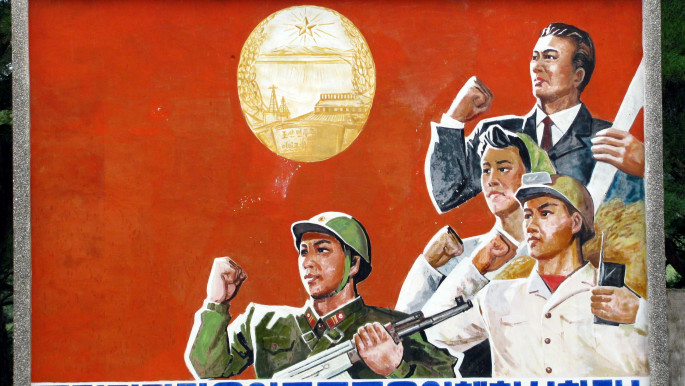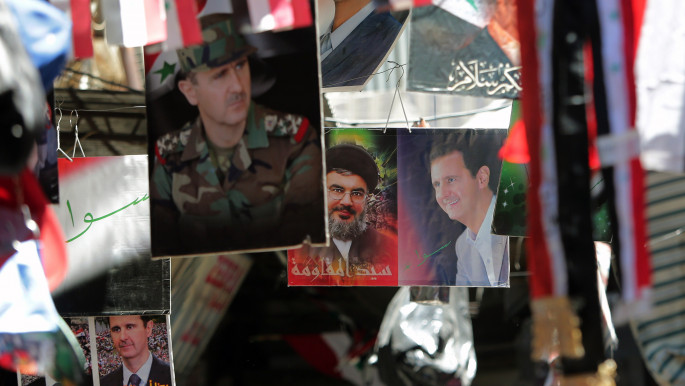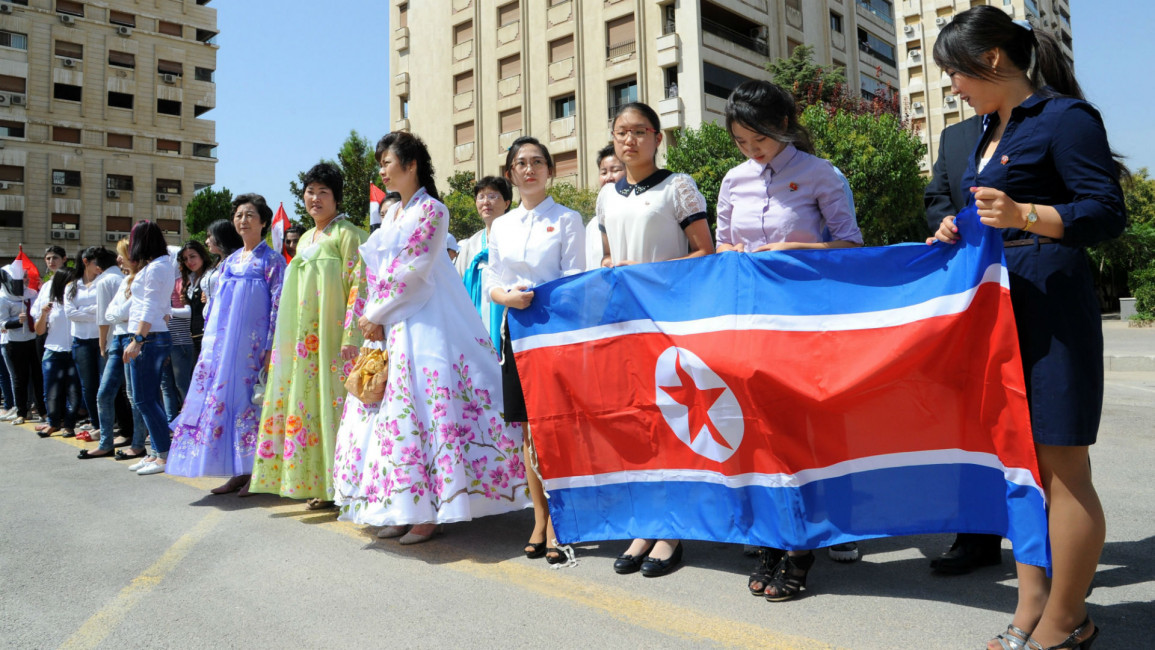
Syria says it with flowers
There is now some small corner of Damascus that is forever North Korea, after the Syrian regime on Monday named a park and street after the East Asian country's founder, Kim Il-sung.
Kim, like his former ally, Hafez al-Assad of Syria, was a cruel dictator who ruled through coercion, slave labour, summary executions and a network of concentration camps.
Dynastic rule
Syria is going through its own hell under Hafez's son, Bashar al-Assad.
Like in Pyongyang, Syria also has a pervasive cult of personality devoted to Hafez and Bashar.
In North Korea, there are around 500 statues dedicated to Kim, his son Kim Jong-il, and grandson Kim Jong-un.
In Damascus, just kilometres away from the 9,000sqm park dedicated to Kim is another sort of camp - Yarmouk.
It was first built as a refuge for Palestinians fleeing from the Israeli army, but now it has become an open-air prison for its 18,000 residents who rebelled against Assad's rule.
Nearby, the Islamic State group is fighting rebels in the Damascus suburbs, hoping to move closer to Syria's seat of power
Like in North Korea's infamous concentration camps, conditions are cramped, endemic with disease, and fully cut off from basic supplies. Many have starved.
In rebel-held Douma - another besieged rebel-held suburb of Damascus - the regime's relentless shelling and dropping of barrel bombs on the trapped inhabitants kills hundreds every week.
Damascus said it named the park in the upmarket Kafr Sousa neighbourhood after Kim to commemorate his role in the liberation of the Korean peninsula from Japanese colonial rule, 70 years ago.
| Article continues below |
 |
| The military is an important component of North Korean propaganda [Getty] |
Syria's deputy foreign minister, Faisal Moqdad, went further, describing the North Korean autocrat as "an historic ruler and leader, famous for his struggle to liberate and build his country".
"For this reason, he deserves to be honoured in Syria," Moqdad added, according to AFP.
Moqdad also thanked North Korea for its support in Syria's war against "terrorism" - the term used by Damascus to denounce all forms of opposition.
North Korea's ambassador played his part, talking of the war as a result of "conspiracies and plots by the US and its pawns with the aim of toppling Syria and establishing control over the Middle East".
Special relationship
Both countries have grown increasingly close during the past four years of Syria's war.
Due to their common isolation, Syria and North Korea have something in common - making them diplomatic and military allies.
Both rule through a tight authoritarian system of patronage. Both inflict the most brutal repression upon their subjects.
Propaganda is prevalent and filled with iconographic images of the rulers and military, with crude - often impotent - nationalistic statements.
| Article continues below |
 |
| Cult of personality: Posters of President Assad fill the streets of Damascus [AFP] |
Both regimes also espouse a bastardised version of socialism.
In their early years, both regimes enjoyed some level of popular support, but, within just a few years, each degenerated into corrupt and dynastic dictatorships.
Karl Marx's vision of a Marxist state was of a dictatorship of the people.
In Syria and North Korea, subjects are victim to networks of intelligence informers and torture cells. Firing squads help entrench the power of the ruling elite.
Inside Syria, access to information has become much more tightly controlled as the war continues into its fifth year.
News from the outside filters into Syria, but there are always controls and monitoring. In North Korea, the internet is banned, apart from for the select few who can access the state-run intranet.
Human rights abuses
For these reasons, Freedom House - an NGO that judges press freedoms - gave the two countries the worst possible freedom index report.
NGOs including Amnesty International routinely denounce human rights violations in both states.
North Korea has been criticised for punishing families of suspects, throwing all into gulag-like concentration camps.
Syria reportedly imprisons and tortures family members of fugitive dissidents to pressure them to hand themselves over to the police or to extract information.
Human Rights Watch has accused Syria of using an "archipelago of torture centres" across the country.
On Monday, the Euro-Mediterranean Human Rights Monitor issued a report saying that the Syrian regime was guilty of forcibly "disappearing" around 65,000 people since the war began in 2011.
The vast majority of those disappeared were civilians, and the figures include 3,879 children and 2,145 women.
Generally speaking, every woman who is "disappeared" suffers sexual abuse before their demise, the report said.
A previous report by the group stated that 11,358 people had died under torture in regime jails, although the real figure could be much higher.
On Twitter, Syrians including writer, Rana Kabbani, mocked the regimes' new friendship.
— Rana Kabbani (@RanaKabbani54) September 1, 2015" style="color:#fff;" class="twitter-post-link" target="_blank">Twitter Post
|
|
Human rights activist, Fadi al-Qadi dismissed the "show of friendship" by the Syrian regime as a marriage of two evils.
|
— Fadi Al-Qadi (@fqadi) August 31, 2015" style="color:#fff;" class="twitter-post-link" target="_blank">Twitter Post
|
Jeyup S Kwaak, Korea reporter with The Wall Street Journal, said the regime might have its mind on more pressing matters than flowers.
|
— Jeyup S. Kwaak 곽제엽 (@kwaakreports) September 1, 2015" style="color:#fff;" class="twitter-post-link" target="_blank">Twitter Post
|



